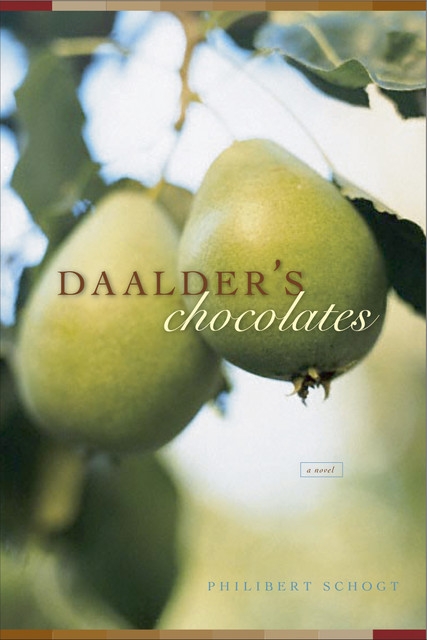Philibert Schogt

Joop Daalder is in search of perfection. A Dutch immigrant and celebrated chocolatier in Toronto, Joop is confronted with ruin when a super-deli is built next to his shop, and his clientele quickly vanish. The last straw is when the deli’s car park is expanded and his shop has to be destroyed. Joop fights against it, in spite of alienating his wife and being laughed at by his son. As the plot proceeds, we learn of Joop’s childhood, when, already an outsider in a family of intellectuals and musicians, where food was of no interest, his taste buds develop unnoticed by the others until he finds his vocation and true happiness as an apprentice to master chocolatier Sorel in France. DAALDER is about love of quality in an era of the perfectly packaged imitation.
‘As rich and bittersweet as the best of Daalder’s creations.’ Kirkus Review
‘Taste, that is what Daalder is all about. Daalder’s talent lies in his tasting abilities. In the end it is also the root of his downfall, because Joop Daalder refuses to make compromises where his taste is concerned… So Daalder is also about pride and stubbornness. These themes stay under the surface in the novel, just as the taste-bouquet of a good bonbon only reveals itself on the tongue … Schogt writes in such a way that you want to know what precisely has happened in this life. He keeps the reader sweet but not by filling his text with frills. Simplicity in form, balance in taste – that is the credo of the chocolatier, and clearly of this writer too. In both cases it works… DAALDER is a tragicomedy that tastes of more.’ Algemeen Dagblad
‘DAALDER has in certain ways something in common with Susskind’s famous novel[Perfume]… In a way it is the civilised person’s version of Susskind’s savage story… Schogt tells the story calmly, without literary acrobatics or dizzy irony. His foremost strength is simplicity and irony. He makes of Joop Daalder an intriguing character … His depiction of his characters has something of the great American master Updike. Without greatly stressing it, his characters experience great conflicts. And in this way you also taste in Daalder’s life story the conflict between European and America culture, between careful craftsmanship and quick opportunism … Schogt manages in this unassuming novel to bring out sparks of tragedy and happiness, passion and despair, criticism and acceptance, egoism and idealism. In the end it has most in common with a Joop Daalder bonbon, simple, without frills but with taste nuances that stay with you for a long time.’ Trouw
‘Just as in THE WILD NUMBERS…the passion which makes his main character shine, at the same time makes him a social amputee… Schogt has a great story and also knows how to build it up.’ De Volkskrant
‘Apart from being a novel about eating, DAALDER is also a family saga. Schogt has a good eye for the pitfalls of upbringing… The experiences of tasting Schogt also knows well now to put into words… The best passages are those in which Daalder behaves as a man with a mission. Against tastelessness, against snobbish yuppiedom.’ Elsevier
Sales
- Arbeiderspers NL (original publisher)
- Thunders Mouth Press USA
- List Verlag Germany
- Garzanti Italy
- Patakis Greece
Material: Dutch, German and Italian and US editions (322pp in English)